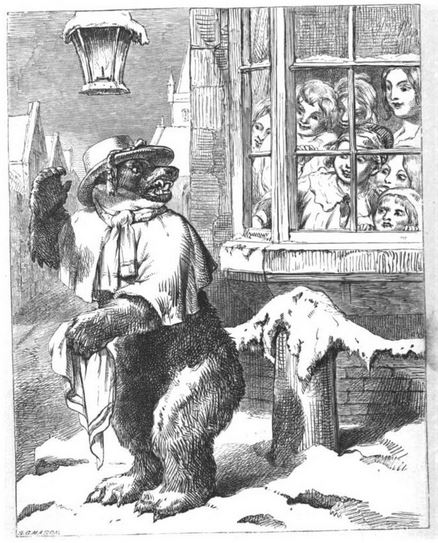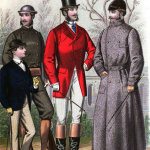
Picture taken from the short story “The Good-natured Bear” by Richard Henry Horne, published 1878, digitized by Google, and pretty much forgotten since then.
It’s really exciting to me that, among other works, the original Winnie The Pooh has entered the public domain as of January 1st, 2022. So has Bambi, another work that a certain megalithic corporation has claimed, but I feel kind of a personal collection to the characters of the Hundred Acre Wood since my mother got the idea to name me from Milne’s works, and at the time “Christopher” seemed like an unusual name, which is probably why a lot of other mothers got the same idea at about the same time. That’s why a high school friend of mine, also named Chris, once said to me, “Yelling ‘Hey Chris!’ in the hall is like going to a Cure concert and yelling ‘Hey, you in the black!'” but that’s another story.
While I get the need to protect an artist’s work for a while–Mozart might not have died poor if he’d been able to collect royalties on the wildly successful run of Don Giovanni in Prague–works entering the public domain always prompts a new burst of creative reinterpretation, especially since writers have been borrowing, adapting, and outright copying since, well, probably before there was even written communication, and at least as long as there’s been recorded history. The writer Spider Robinson summed up the trouble with permanent ownership in his short story Melancholy Elephants.
I’m just saying it’s fine for artists to make money from their works but once they’re gone there’s a time to, you know, let it go. And it seemed like it was that simple until I received this:
From: The Walt Disney Corporation
To: Christopher Allen Waldrop
Subject: Winnie The Pooh
Dear Mr. Waldrop,
Regarding recent reports of Winnie The Pooh and associated characters (excluding Tigger) now being in the public domain I would like to inform you that Winnie The Pooh(tm) and all associated characters, as well as all motion pictures, including but not limited to theatrical releases, television shows, and direct-to-video productions, as well as all toys, board games, or other products and merchandise bearing the names or likenesses of Winnie The Pooh(tm) and all associated characters, and all written materials about Winnie The Pooh(tm) and all associated characters are the sole property of The Walt Disney Corporation. Any use of or reference to Winnie The Pooh(tm) and all associated characters and settings, including but not limited to the childhood home of Christopher “Robin” Milne, son of A.A. Milne, and The Hundred Acre Wood(r) is forbidden without the express permission of The Walt Disney Corporation. This includes any and all quotations as well as parodies, which are not covered by the statute of Fair Use, as determined by summary legal judgment (cf. Disney v. Keaton, Disney v. Ellison, Disney v. Fleischer, Disney v. Thames Television, etc.).
I am aware that you may attempt to reply to this notice by citing, paraphrasing, or plagiarizing a letter from Julius “Groucho” Marx to the Warner Brothers Film Studio, sent when said film studio objected to the Marx Brothers’ use of the name “Casablanca” in the title of their film “A Night In Casablanca”. I realize that Mr. Marx’s reply included, among other things, an implied threat of a countersuit because the Marxes had been brothers before the Warners. I know you are familiar with this letter because you checked out the book Life With Groucho by Arthur Marx from a local academic library on August 25th, 1996, at 12:24PM CDT. You subsequently returned said book on September 17th, 1996, at 6:48AM CDT. At both times you declined to pay $0.40 in fines which you owed for a previous book (The Bedbug & Selected Poems by Vladimir Mayakovsky) which you had checked out but did not read. I am also aware that you have described Mr. Marx’s correspondence with Warner Brothers in reference to stories of allegedly ludicrous or egregious copyright infringement suits on blogs where you comment under the pseudonym “Spunky The Wonder Squid”.
It is my duty to inform you that The Walt Disney Corporation has acquired The Marx Brothers, including, but not limited to, all motion pictures, television appearances, and written materials, as well as assorted paraphernalia or any likeness of said Brothers (cf. Disney v. Menkmann Bros., producers of a “fake schnozz” with mustache and glasses). I must therefore ask that you cease and desist quoting from or paraphrasing Mr. Marx’s letter, as well as any other quotes, actual or attributed, or making any references to The Marx Brothers(c) herewith without the express permission of The Walt Disney Corporation.
Regarding your use of the name “Spunky The Wonder Squid” I must also inform you that The Walt Disney Corporation has acquired the entire television series Night Flight, which ran on the USA Network as well as in syndication from 1981 to 1988. This acquisition included the eight-episode parody series “Dynaman”, later repackaged, with additional or replacement sequences, but with all humor and music by the B-52’s removed, as “The Mighty Morphin Power Rangers”, subsequently “Power Rangers”. I must therefore ask that you cease all use of the name “Spunky The Wonder Squid” without the express permission of The Walt Disney Corporation.
In addition I must further inform you that The Walt Disney Corporation has acquired or has always had ownership of the following: The Muppets, Star Wars, Looney Tunes, the complete works of Jules Verne, Star Trek, Dangermouse, the complete works of Theodore Geisel (AKA “Dr. Seuss”), Forbidden Planet (1956), The Twilight Zone (TV series), The Twilight Zone (song, acquired with the complete catalog of Golden Earring), The Rocky Horror Picture Show, as well as its sequel and all related materials including but not limited to the stage production, The Creature From The Black Lagoon and all subsequent sequels and remakes, Little Shop of Horrors (1960), Little Shop of Horrors (1986), the complete works of Kurt Vonnegut, the complete works of Eleanor Cameron, Monty Python’s Flying Circus and all productions of Python (Monty), Ltd., Invasion of the Body Snatchers (1956), Invasion of the Body Snatchers (1978), Body Snatchers (1993), The Invasion (2007), the complete works of Arthur C. Clarke, the entire country of Sri Lanka, the following TV series not previously listed: The Kids In The Hall, You Can’t Do That On Television, M*A*S*H*, Cheers, Jeopardy!, Doctor Who, the complete filmography of Stanley Kubrick, the complete filmography of Peter Lorre, the complete filmography of Mel Brooks, the complete works of Virginia Woolf, the complete works of Amadeus Mozart, and “Freckles”, the neighborhood Springer Spaniel whom you played with from ages four through thirteen, and who was the sire of your dog “Friskie” (patent pending). Since there is a chance, albeit small, that you will respond to this letter with Tom Petty’s song “I Won’t Back Down”, I must warn you that several years ago Mr. Petty signed a contract giving ownership of his soul to Hell, Ltd., in exchange for becoming a “triple threat” (singer/musician/animated character). As a result of a 1995 merger The Walt Disney Corporation acquired all property and individuals owned at the time by Hell, Ltd., as well as several relevant personnel. (Mr. Beelzebub, a former CEO of Hell, Ltd., is now The Walt Disney Corporation’s Vice President in charge of Human Resources.) Quoting from Mr. Petty’s song, including use of the phrase “I won’t back down” is not allowed without the express permission of The Walt Disney Corporation.
The Walt Disney Corporation is now also the sole owner and licensor of the following: the epic of Gilgamesh, the Egyptian Book of The Dead, the Illiad and Odyssey by “Homer”, the complete works of William Shakespeare, Samuel Clemens, Emily Dickinson, Jules Verne, Publius Ovidius Naso, and other materials previously considered to have been available as part of the public domain. This acquisition occurred as part of recent legislation passed as an addendum as provided by a codicil in the 1998 Copyright Extension Act, section 42, subsection L, which specifically provided The Walt Disney Corporation authority to extend all copyrights past, present, and future to infinity and beyond. These items are owned in toto, as is the dog Toto, as part of The Walt Disney Corporation’s acquisition of all print and motion picture versions of The Wizard of Oz, as well as all related materials, sequels, remakes, etc. The Walt Disney Corporation also owns the band Toto. However as your inability to sing in any key renders the song “Africa” unrecognizable to anyone but yourself we do not feel it is necessary at this time to request that you cease and desist singing it in the shower.
Finally, due to what our legal department has deemed “an uncanny resemblance” to the character “Gepetto” as drawn by Walt Disney himself the Walt Disney Corporation has acquired sole rights to the brother of your paternal grandfather Mr. Allen Jackson Waldrop, AKA “Uncle Jack”.
I must therefore ask that you cease and desist quoting from, paraphrasing, or referring to any material licensed and owned by The Walt Disney Corporation without prior express permission granted in writing. Failure to do so will result in a minimum fine of $25,000.00 per infringement as well as imprisonment in an undisclosed location (known forthwith as “the unhappiest place on Earth”) for no less than five years. As The Walt Disney Corporation has just acquired the complete works of Franz Kafka our legal department has determined that such requests may, in themselves, be determined to constitute infringement if they mention by name any character, personage, or item owned by The Walt Disney Corporation.
Respectfully,
Smedley Force, The Walt Disney Corporation
Department of Legal Affairs, Copyright Infringement
Division of Written Materials (spec. Talking Animals)






I’m confused. Can you still use your name or is that a violation as well? And none of that would surprise me in the least. (Well, yes, of course it would).
Copyright law is incredibly convoluted and confusing, but you can use my name whenever you like; however there’s a small fee for doing so.
Two paragraphs in, I was like “Doesn’t Disney own Winnie?” and then you answered that question and more. But do they seriously own Monty Python?! I’m in a lot of trouble if that’s the case! I do remember a woman being sued by Disney decades ago for painting a mural on her baby’s nursery wall of Disney characters. They got wind of it and she had to paint over it–or maybe that was an urban myth. At any rate, I guess I’ll be calling you Stan from now on…
I wouldn’t be surprised if a woman really was sued for painting a mural of Disney characters in her own home, and of course the great irony is that Disney wouldn’t be so successful if they hadn’t been able to pull fairy tales from the public domain, or, for that matter, if old Walt himself hadn’t ripped off a six-month old Buster Keaton film to make the first Mickey Mouse cartoon.
You really owned this post, Christopher.
I gladly relinquish all ownership of your comments to you, Ann, although they mean enough to me that I want to keep them.
non sequitur today (20 february) on the comics page finally caught up with you on the winnie the pooh public domain news. great scoop.
The comics page is always slightly behind the times (according to some artists their comics are written as much as a year in advance) but time keeps rolling forward. Soon even Mickey Mouse will be in the public domain.